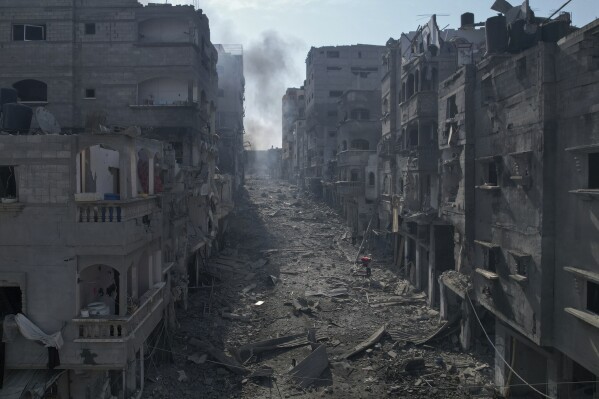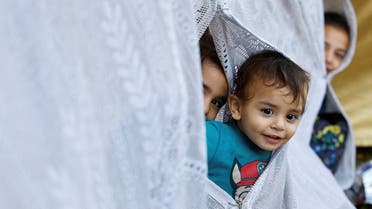As desperation in Gaza grows, Israel pledges to block vital aid until Hamas releases hostages
Some 447 children and 248 women are among the 1,417 killed in Israeli strikes in the Gaza Strip, the Palestinian health ministry said on Thursday.
“The health care system in Gaza has collapsed,” he said, adding that the hospital can no longer receive any more wounded people.
A visit by Secretary of State Antony Blinken, along with shipments of U.S. weapons, offered a powerful green light to Israel to drive ahead with its retaliation in Gaza after Hamas’ deadly attack on civilians and soldiers, even as international aid groups warned of a worsening humanitarian crisis. Israel has halted deliveries of basic necessities and electricity to Gaza’s 2.3 million people and prevented entry of supplies from Egypt.
Lt. Col. Richard Hecht, an Israeli military spokesman, told reporters Thursday that forces “are preparing for a ground maneuver” should political leaders order one.
Hamas’ assault on Saturday killed more than 1,300 people in Israel, including 247 soldiers — a toll unseen in Israel for decades — and the ensuing Israeli bombardment has killed more than 1,530 people in Gaza, according to authorities on both sides. Israel says roughly 1,500 Hamas militants were killed inside Israel, and that hundreds of the dead in Gaza are Hamas members. Thousands have been wounded on both sides.
A strike Thursday afternoon in the Jabaliya refugee camp took down a residential building on families sheltering inside, killing at least 45 people, Gaza’s Interior Ministry said. At least 23 of the dead were under the age of 18, including a month-old child, according to a list of the casualties.
The home belonging to the al-Shihab family was packed with relatives who had fled bombing in other areas. Neighbors said a second house was hit at the same time, but the toll was not immediately known. The Israeli military did not immediately respond to a request for comment.
By Wednesday night, the number of people who fled their homes reached 340,000 people — roughly 15% of Gaza’s population. Most crowded into U.N.-run schools while others stayed with relatives or even strangers.
Families were cutting down to one meal a day, said Rami Swailem, a 34-year-old lecturer at al-Azhar University, who had 32 relatives sheltering in his home. Water stopped coming to the building two days ago, and they have rationed what’s left in a tank on the roof.
Alaa Younis Abuel-Omrain has been staying in a U.N. school after a strike on her home killed eight members of her family — her mother, aunt, a sister, a brother and his wife and their three children. Most bakeries stopped producing bread for lack of electricity.
“Even if there is food in some areas, we can’t get to it because of strikes,” she said.
The ministry has also reported 6,268 wounded since Saturday.
Earlier on Saturday, the director of al-Shifa Hospital in the strip told Al Arabiya that more than 50 percent of those killed by Israeli strikes on the strip are women and children.
“The health care system in Gaza has collapsed,” he said, adding that the hospital can no longer receive any more wounded people.
He also warned that a power outage will lead to several deaths and called for opening safe passages to deliver medical supplies.
Meanwhile, Fabrizio Carboni, a senior official with the International Committee of the Red Cross (ICRC) said the humanitarian situation in Gaza will become “unmanageable very quickly.”
His comments came as Israel pounded the Hamas-ruled territory, home to 2.3 million people, following Hamas’s attack on Israel on Saturday that killed more than 1,200 people. In Gaza, officials have reported more than 1,200 people killed in Israeli retaliatory strikes.
In recent days Israel announced a “complete siege” on Gaza, cutting off water, fuel and electricity supplies. The Palestinian territory’s sole power plant shut down on Wednesday after running out of fuel.
Warning sirens sound in northern Israel
The military said it “launched an interceptor following an aerial identification” and was investigating the cause.


